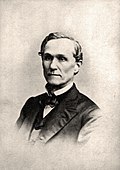| |||||||||||||||||
 County results Watts: 50-60% 60-70% 70-80% 80-90% >90% Shorter: 50-60% 60-70% 70-80% >90% Returns Rejected | |||||||||||||||||
| |||||||||||||||||
The 1863 Alabama gubernatorial election took place on August 3, 1863 [1] in order to elect the governor of Alabama. Whig Thomas Hill Watts won his first term as governor. [2]


